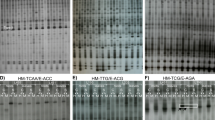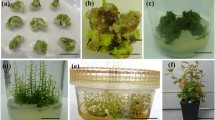Abstract
Soybean is recognized as one of the plants which are very difficult to be transformed. Considering the low transformation efficiency of soybean, we aimed to determine the effect of 6-benzylaminopurine (6-BA), shoot induction time, and infection time of Agrobacterium on the clonal propagation of Glycine max. Results showed that 1.6 mg/L 6-BA could be optimal to promote the induction of adventitious shoots. An induction time of 15 d was considered optimal for the actual experiment involving soybean shoot induction. Agrobacterium was cultured until an OD600 = 0.8 was reached for an infection time of 30 min; this infection time may be optimal to promote soybean transformation. Whole genome DNA methylation was analyzed by high-performance liquid chromatography (HPLC)-assisted quantification, and DNA methylation result is consistent with the phenotypic data of shoot development. In addition, two methylation-related genes (decrease in DNA methylation 1 and DNA methyl transferases chromomethylase 2) were analyzed to determine expression differences by qRT-PCR in the shoots that were developed under different experimental conditions. In general, the expression values of these genes were normally downregulated under the recommended experimental conditions of soybean regeneration. This study showed the overall methylation changes in the in vitro culture of soybean, as affected by several variable parameters, which is useful to promote the transformation efficiency of soybean.
Similar content being viewed by others
References
Cassidy, A. and Faughnan, M., Phyto-oestrogens through the life cycle, Proc. Nutr. Soc., 2000, vol. 59, pp. 489–496.
Natarajan, S., Luthria, D., Bae, H., et al., Transgenic soybeans and soybean protein analysis: an review, J. Agric. Food Chem., 2013, vol. 61, pp. 11736–11743.
De Bruin, J.L. and Pederson, P., Yield improvement and stability for soybean cultivars with resistance to Heterodera glycines Ichinohe, Agron. J., 2008, vol. 100, pp. 1354–1359.
Ray, D.K., Mueller, N.D., West, P.C., et al., Yield trends are insufficient to double global crop production by 2050, PloS One, 2013, vol. 19. e66428
Olhoft, P.M., Flagel, L.E., Donocan, C.M., et al., Efficient soybean transformation using hygromycin B selection in the cotyledonary-node method, Planta, 2003, vol. 216, pp. 723–735.
Xue, R.G., Xie, H.F., and Zhang, B., A multi-needleassisted transformation of soybean cotyledonary node cells, Biotechnol. Lett., 2006, vol. 28, pp. 1551–1557.
Yang, Z.H., Jin, H., Plaha, P., et al., An improved regeneration protocol using cotyledonary explants from inbred lines of Chinese cabbage (Brasica rapa ssp. pekinensis), J. Plant Biotechnol., 2004, vol. 6, pp. 235–239.
Olhoft, P.M., Lin, K., Galbraith, J., et al., The role of thiol compounds increasing Agrobacterium-mediated transformation of soybean cotyledonary-node cells, Plant Cell Rep., 2001, vol. 20, pp. 731–737.
Liu, S.J., Wei, Z.M., and Huang, J.Q., The effect of cocultivation and selection parameters on Agrobacterium-mediated transformation of Chinese soybean varieties, Plant Cell Rep., 2008, vol. 27, pp. 489–498.
Miguel, C. and Marum, L., An epigenetic view of plant cells cultured in vitro: somaclonal variation and beyond, J. Exp. Bot., 2011, vol. 62, pp. 3713–3725.
Us-Camas, R., Rivera-Solis, G., Duarte-Ake, F., et al., In vitro culture: an epigenetic challenge for plants, Plant Cell Tiss. Organ Cult., 2014. doi 10.1007/s11240014-0482-8
Henderson, I.R. and Jacobsen, S.E., Epigenetic inheritance in plants, Nature, 2007, vol. 447, pp. 418–424.
Feng, S., Cokus, S.J., Zhang, X., et al., Conservation and divergence of methylation patterning in plants and animals, Proc. Natl. Acad. Sci., 2010, vol. 107, pp. 8689–8694.
Chinnusamy, V. and Zhu, J.K., Epigenetic regulation of stress responses in plants, Curr. Opin. Plant Biol., 2009, vol. 12, pp. 133–139.
Fraga, M. and Esteller, M., DNA methylation: a profile of methods and applications, BioTechniques, 2002, vol. 33, pp. 636–649.
Smykal, P., Valledor, L., Rodriguez, R., et al., Assessment of genetic and epigenetic stability in long-term in vitro shoot culture of pea (Pisum sativum L.), Plant Cell Rep., 2007, vol. 26, pp. 1985–1998.
Kour, G., Kour, B., Kaul, S., et al., Genetic and epigenetic instability of amplification-prone sequences of a novel B chromosome induced by tissue culture in Plantago lagopus L., Plant Cell Rep., 2009, vol. 28, pp. 1857–1867.
Dann, A.L. and Wilson, C.R., Comparative assessment of genetic and epigenetic variation among regenerants of potato (Solanum tuberosum) derived from long-term nodal tissue-cultured and cell selection, Plant Cell Rep., 2011, vol. 30, pp. 631–639.
Neelakandan, A.K. and Wang, K., Recent progress in the understanding of tissue culture-induced genome level changes in plants and potential applications, Pant Cell Rep., 2012, vol. 31, pp. 597–620.
Demeulemeester, M.A.C., Stallen, N.V., and De Proft, M.P., Degree of DNA methylation in chicory (Cichorium intybus L.): influence of plant age and vernalization, Plant Sci., 1999, vol. 142, pp. 101–108.
Rival, A., Ilbert, P., Labeyrie, A., et al., Variations in genomic DNA methylation during the long-term in vitro proliferation of oil palm embryogenic suspension cultures, Plant Cell Rep., 2012, vol. 32, pp. 359–368.
Plitta, B.P., Michalak, M., Naskret-Barciszewska, M.Z., et al., DNA methylation of Quercus robur L. plumules following cryopretreatment and cryopreservation, Plant Cell Tiss. Organ Cult., 2014, vol. 117, pp. 31–37.
Liu, H.K., Yang, C., and Wei, Z.M., Efficient Agrobacterium tumefaciens-mediated transformation of soybeans using an embryonic tip regeneration system, Planta, 2004, vol. 219, pp. 1042–1049.
Boyko, A. and Kovalchuk, I., Epigenetic controls of plant stress response, Environ. Mol. Mutagen., 2008, vol. 49, pp. 61–72.
Author information
Authors and Affiliations
Corresponding authors
Additional information
The article is published in the original.
Rights and permissions
About this article
Cite this article
Jiang, J., Wang, Y., Xie, T. et al. DNA methylation analysis during the optimization of Agrobacterium-mediated transformation of soybean. Russ J Genet 52, 56–63 (2016). https://doi.org/10.1134/S1022795416010087
Received:
Published:
Issue Date:
DOI: https://doi.org/10.1134/S1022795416010087




